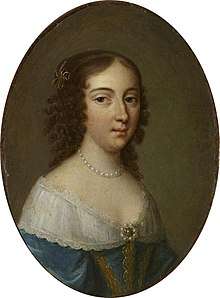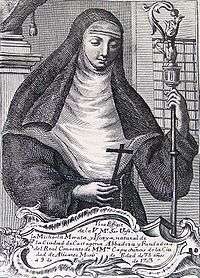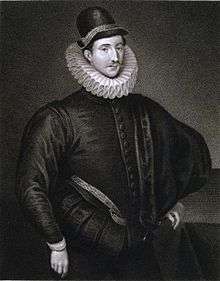1628
1628 (MDCXXVIII) was a leap year starting on Saturday of the Gregorian calendar and a leap year starting on Tuesday of the Julian calendar, the 1628th year of the Common Era (CE) and Anno Domini (AD) designations, the 628th year of the 2nd millennium, the 28th year of the 17th century, and the 9th year of the 1620s decade. As of the start of 1628, the Gregorian calendar was 10 days ahead of the Julian calendar, which remained in localized use until 1923.
| Millennium: | 2nd millennium |
|---|---|
| Centuries: | |
| Decades: | |
| Years: |
| 1628 by topic |
|---|
| Arts and science |
| Leaders |
| Birth and death categories |
| Births – Deaths |
| Establishments and disestablishments categories |
| Establishments – Disestablishments |
| Works category |
|
| Gregorian calendar | 1628 MDCXXVIII |
| Ab urbe condita | 2381 |
| Armenian calendar | 1077 ԹՎ ՌՀԷ |
| Assyrian calendar | 6378 |
| Balinese saka calendar | 1549–1550 |
| Bengali calendar | 1035 |
| Berber calendar | 2578 |
| English Regnal year | 3 Cha. 1 – 4 Cha. 1 |
| Buddhist calendar | 2172 |
| Burmese calendar | 990 |
| Byzantine calendar | 7136–7137 |
| Chinese calendar | 丁卯年 (Fire Rabbit) 4324 or 4264 — to — 戊辰年 (Earth Dragon) 4325 or 4265 |
| Coptic calendar | 1344–1345 |
| Discordian calendar | 2794 |
| Ethiopian calendar | 1620–1621 |
| Hebrew calendar | 5388–5389 |
| Hindu calendars | |
| - Vikram Samvat | 1684–1685 |
| - Shaka Samvat | 1549–1550 |
| - Kali Yuga | 4728–4729 |
| Holocene calendar | 11628 |
| Igbo calendar | 628–629 |
| Iranian calendar | 1006–1007 |
| Islamic calendar | 1037–1038 |
| Japanese calendar | Kan'ei 5 (寛永5年) |
| Javanese calendar | 1549–1550 |
| Julian calendar | Gregorian minus 10 days |
| Korean calendar | 3961 |
| Minguo calendar | 284 before ROC 民前284年 |
| Nanakshahi calendar | 160 |
| Thai solar calendar | 2170–2171 |
| Tibetan calendar | 阴火兔年 (female Fire-Rabbit) 1754 or 1373 or 601 — to — 阳土龙年 (male Earth-Dragon) 1755 or 1374 or 602 |
| Wikimedia Commons has media related to 1628. |
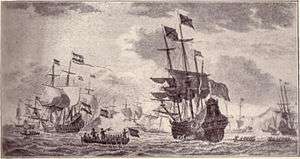
September 7–8: Dutch admiral Piet Hein captures the Spanish treasure fleet in the Battle in the Bay of Matanzas.
Events
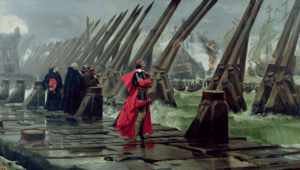
January–June
- January 25 – Shah Jahan is crowned as ruler of the Mughal Empire, in Agra.
- March 1 – Writs issued in February, by King Charles I, require every county in England (not just seaport towns) to pay ship tax by this date.
- March 17 – Oliver Cromwell makes his first appearance in the English Parliament, as Member for Huntingdon.
- May–August 4 – Thirty Years' War: As a result of its refusal to accept the Capitulation of Franzburg, Stralsund is besieged by Wallenstein's imperial army.
- June 7 – King Charles I reconvenes the English Parliament, and accepts the Petition of Right as a concession to gain his subsidies.
July–December
- August 4 – Thirty Years' War: With the help of Danish and Swedish reinforcements, Stralsund is able to resist Wallenstein's siege until the landing of a Danish army, led by Christian IV of Denmark, forces Wallenstein to raise the siege, and move his army to confront the new threat.
- August 10 – The Swedish 64-gun sailing ship Vasa sinks on her maiden voyage, in Stockholm Harbor, removed in 1961.
- August 23 – George Villiers, the first Duke of Buckingham, is assassinated by John Felton.
- September 2 – Thirty Years' War – Battle of Wolgast: Wallenstein defeats Christian IV of Denmark's army.
- September 6 – Puritans settle Salem, which will later become part of Massachusetts Bay Colony.
- September 7–8 – Eighty Years' War – Battle in the Bay of Matanzas: Dutch admiral Piet Hein captures 16 ships of the Spanish treasure fleet. The immense booty taken brings in over 11 million guilders, part of which is used to fund the entire army of the Dutch Republic for eight months.
- October 22 – Abaza Mehmed Pasha surrenders to Ottoman forces, ending the Abaza rebellion.
- October 28 – The Siege of La Rochelle ends, with the surrender of the Huguenots.
Date unknown
- The War of the Mantuan Succession breaks out over Mantua and Montferrat. The war is fought between the Duke of Savoy, who is supported by Spain, and the Duke of Nevers, who is supported by France.
- William Harvey publishes Exercitatio Anatomica de Motu Cordis et Sanguinis in Animalibus in Frankfurt, containing his findings about blood circulation.
- Publication of Sir Edward Coke's Institutes of the Lawes of England begins with A Commentary upon Littleton. This will remain an influential legal text on both sides of the Atlantic for three centuries.
- The Collegiate School, the oldest surviving educational institution in North America, is established.
- The first black slaves arrive in Dutch Manhattan.
Births
January–March
- January 1 – Christoph Bernhard, German composer (d. 1692)
- January 3 – Alvise II Mocenigo, Doge of Venice (d. 1709)
- January 8 – François-Henri de Montmorency, duc de Luxembourg, French general (d. 1695)
- January 10
- John Bennet, English landowner and politician (d. 1663)
- Jan Theunisz Blanckerhoff, Dutch Golden Age marine painter (d. 1669)
- January 12 – Charles Perrault, French folklorist (d. 1703)
- January 14 – Sir Roger Bradshaigh, 1st Baronet, English politician (d. 1684)
- January 19 – Charles Stanley, 8th Earl of Derby, English noble (d. 1672)
- January 20 – Henry Cromwell, 4th son of Oliver Cromwell and Elizabeth Bourchier (d. 1674)
- January 23 – Johann Reinhard II, Count of Hanau-Lichtenberg, German aristocrat (d. 1666)
- January 30 – George Villiers, 2nd Duke of Buckingham, English statesman (d. 1687)
- February 1 – Jan Hackaert, Dutch painter (d. 1685)
- February 5 – César d'Estrées, French Catholic cardinal (d. 1714)
- February 14 – Valentine Greatrakes, Irish faith healer (d. 1682)
- February 24 – Paolo Spinola, 3rd Marquis of the Balbases and 3rd Duke of San Severino and Sesto (d. 1699)
- February 25 – Claire-Clémence de Maillé-Brézé, French noblewoman (d. 1694)
- March 2 – Cornelis Speelman, Governor-General of the Dutch East Indies (d. 1684)
- March 10
- Marcello Malpighi, Italian biologist and physician (d. 1694)
- François Girardon, French sculptor (d. 1715)
- March 12 – Jacques Frémin, French Jesuit missionary to Canada (d. 1691)
- March 17 – Daniel Papebroch, Flemish Jesuit hagiographer (d. 1714)
- March 20 – Sir John Hobart, 3rd Baronet, English landowner and politician (d. 1683)
- March 24 – Sophie Amalie of Brunswick-Lüneburg (d. 1685)
April–June
- April 2 – Constantin Christian Dedekind, German poet, dramatist and composer (d. 1715)
- April 16 – Cornelis Evertsen the Younger, Dutch admiral (d. 1679)
- April 22 – Georg Matthäus Vischer, Austrian cartographer (d. 1696)
- April 23
- Johann van Waveren Hudde, Dutch mathematician (d. 1704)
- Johannes Hudde, burgomaster (mayor) of Amsterdam (d. 1704)
- April 24 – William Beecher, English politician (d. 1694)
- April 25 – Sir William Temple, 1st Baronet, English statesman and essayist (d. 1699)
- May 7 – Étienne Le Hongre, French sculptor (d. 1690)
- May 8 – Angelo Italia, Sicilian Jesuit architect (d. 1700)
- May 9 – Sir William Gardiner, 1st Baronet, English Member of Parliament (d. 1691)
- May 15
- Dominique Bouhours, French Jesuit priest (d. 1702)
- Carlo Cignani, Italian painter of the Bolognese and the Forlivese school (d. 1719)
- May 17 – Ferdinand Charles, Archduke of Austria (d. 1662)
- May 24 – Marek Sobieski, Polish noble (szlachcic) (d. 1652)
- June 1 – John Dugdale, English herald in the College of Arms (d. 1700)
- June 4 – Christopher Delphicus zu Dohna, Swedish diplomat (d. 1668)
- June 5 – Arthur Sparke, English lawyer and politician (d. 1677)
- June 15 – Walter Marshall, British theologian (d. 1680)
- June 21 – Alexander Parker, English Quaker preacher and author (d. 1689)
- June 30 – Miguel de Molinos, Spanish mystic (d. 1696)
July–September
- July 11 – Tokugawa Mitsukuni, Japanese warlord (d. 1701)
- July 12 – Henry Howard, 6th Duke of Norfolk (d. 1684)
- July 17 – Richard Powle, English politician (d. 1678)
- August 12 – Gabriel Gerberon, French Jansenist monk (d. 1711)
- August 20 – Emmanuel Philibert, Prince of Carignano, Prince of Savoy (d. 1709)
- August 29
- Jan Pieter Brueghel, Flemish Baroque painter (d. 1664)
- John Granville, 1st Earl of Bath, English royalist statesman (d. 1701)
- September 7 – Sir William Courtenay, 1st Baronet, English politician (d. 1702)
- September 21 – Barend Graat, Dutch painter (d. 1709)
- September 23 – David Klöcker Ehrenstrahl, German artist (d. 1698)
October–December
- October 12
- Hermann of Baden-Baden, Imperial field marshal and president of the Hofkriegsrat (d. 1691)
- William Christopher of Baden-Baden, margrave of Baden and canon at Cologne (d. 1652)
- October 21 – Úrsula Micaela Morata, Spanish writer (d. 1703)
- October 23 – Henry Eyre, English politician and lawyer (d. 1678)
- October 24 – Lucrezia Barberini, Italian noblewoman (d. 1699)
- November 20 – Matthias Sention Jr., Connecticut settler (d. 1728)
- November 30 (baptised) – John Bunyan, English writer (d. 1688)
- December 2 – Johannes Rothe, Dutch preacher (d. 1702)
- December 10 – Jan Baptist Martin Wans, Flemish painter (d. 1684)
- December 12 – Anna Salome of Manderscheid-Blankenheim, German abbess of Thorn Abbey, later abbess of Essen Abbey (d. 1691)
- December 19 – Charlotte of the Palatinate, German noble (d. 1631)
- December 21 – Samuel Capricornus, Czech composer (d. 1665)
- December 25 – Noël Coypel, French painter (d. 1707)
- December 26 – John Page, American politician (d. 1692)
Probable
- Josias Fendall, Colonial governor of Maryland (d. 1687)
- Jacob Isaacksz van Ruisdael, celebrated Dutch landscape painter (d. 1682)
Deaths
- January 12 – Francisco Ribalta, Spanish painter (b. 1565)
- January 21 – Gregor Aichinger, German composer (b. c. 1565)
- January 23 – Shahryar, fifth son of the Mughal emperor Jahangir (b. 1605)
- January 29 – Philip Ernest, Count of Hohenlohe-Langenburg (1610–1628) (b. 1584)
- March 12 – John Bull, English composer (b. c. 1562)
- March 29 – Tobias Matthew, English Archbishop of York (b. 1546)
- April 17 – Rudolf Christian, Count of East Frisia, ruler of East Frisia (b. 1602)
- June 8 – Rudolph Goclenius, German philosopher (b. 1547)
- July 11 – David Origanus, German astronomer (b. 1558)
- July 13 – Robert Shirley, English adventurer (b. c. 1581)
- July 18 – John Frederick, Duke of Württemberg (1608–1628) (b. 1582)
- August 6 – Johannes Junius, Mayor of Bamberg, Germany (b. 1573)
- August 20 – Sir Charles Morrison, 1st Baronet, Member of the Parliament of England (b. 1587)
- August 23 – George Villiers, 1st Duke of Buckingham, English statesman (b. 1592)
- September 23 – Amalia von Hatzfeld, Swedish-Finnish governor (b. 1560)
- September 25 – Magdalene of Bavaria, Consort of Wolfgang William, Count Palatine of Neuburg (b. 1587)
- September 30 – Fulke Greville, 1st Baron Brooke, English writer (b. 1554)
- October 16 – François de Malherbe, French poet and critic (b. 1555)
- October 17 – John Frederick, Duke of Saxe-Weimar (b. 1600)
- November 15 – Roque Gonzales, Paraguayan missionary (b. 1576)
- November 16 – Paolo Quagliati, Italian composer (b. c. 1555)
In fiction
- The events of the historical novel The Three Musketeers by Alexandre Dumas take place in this year, and include fictionalized versions of the Siege of La Rochelle and the assassination of the Duke of Buckingham.
gollark: I mean, "the enemy is the self" seems like "do the opposite of what's good for you" read literally, thus bad.
gollark: Yeees, literally speaking it seems like a bad principle.
gollark: Does that... mean... anything... at all?
gollark: Yes, you said that.
gollark: ···
References
This article is issued from Wikipedia. The text is licensed under Creative Commons - Attribution - Sharealike. Additional terms may apply for the media files.
